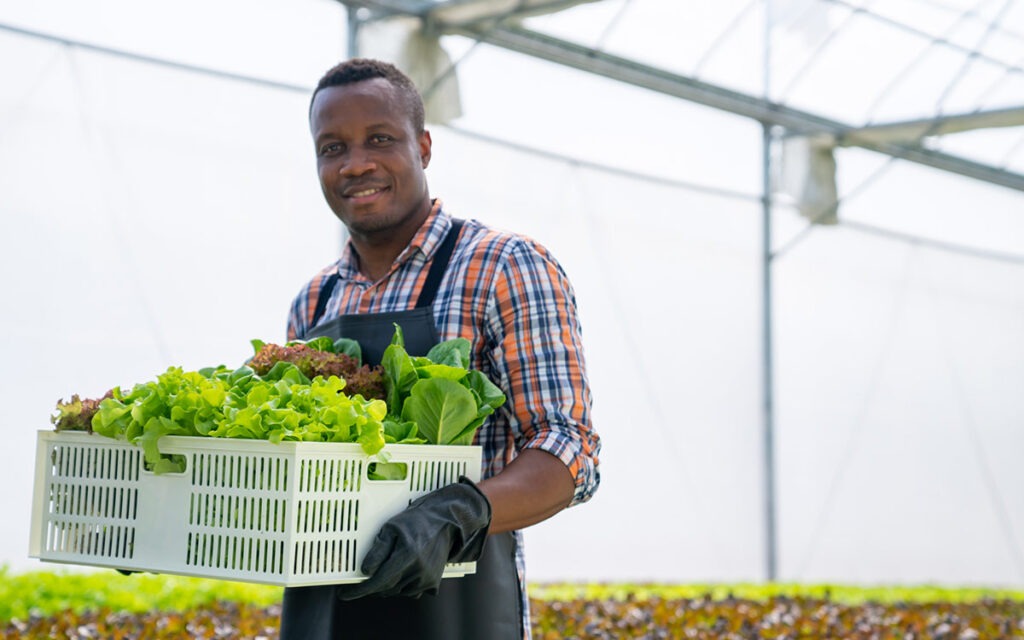

This article concludes Black Food Sovereignty: Stories from the Field, a series that has been co-produced by Frontline Solutions and NPQ. This series features stories from a group of Black food sovereignty leaders who are working to transform the food system at the local level. It explores how these leaders are addressing critical issues at the intersection of food sovereignty, racial and economic justice, and community.
Mississippi has a rich culture, but for generations, its Black communities have experienced health inequities intertwined with discrimination, poverty, and racial exclusion. The state, indeed, has a crippling legacy of encouraging economic exploitation, virulent racism, and extreme poverty—rooted in racial capitalism and the South’s slavery-based agrarian economy, vestiges of which persist today.
This is particularly true for the Mississippi Delta region, comprised of 18 counties in Northwest Mississippi. The delta is a largely rural, agricultural area with a troubled history of racial and economic disparities. Although farmland is abundant in the region, the number of Black-owned family farms has dwindled. Of the food grown in the delta and the overall $6 billion in food that is grown in Mississippi, 90 percent is exported, as a 2014 report from the nonprofit, Crossroads Resource Center, documents. Conversely, the same report documents that 90 percent of food consumed in the delta and statewide is sourced elsewhere.
In 2000, Congress created the Delta Regional Authority (DRA) to address these issues. The legislation stated, correctly, that “a concerted and coordinated effort” was needed. But while the DRA is a valued partner for community groups, food justice activism in the delta, particularly among Black farmers and community organizations, precedes the authority’s creation.
Advancing Food Justice in the Delta: The Central Role of Black Co-ops
A key moment in Mississippi’s food justice movement occurred 50 years ago, with the founding of the Mississippi Association of Cooperatives (MAC), a coalition of Black farmers who formed 10 worker-owned cooperative farms to gain economic security and improve their quality of life.
The cooperatives’ members democratically own, manage, and share the farms’ profits, in contrast to corporate farms, which extract farm labor to generate wealth for (mainly white) farm owners. Some Black farmer co-ops, however, predate the formation of MAC. One of the most well-known Black-led farm cooperatives is located in Mileston, Mississippi, in Holmes County. A former 10,000-acre plantation, Mileston was purchased by the federal government in 1940 as part of the Resettlement Administration and redistributed to African Americans in the region, who formed 13 cooperative farms, which are owned by their descendants today. The West Holmes Community Development Organization, which traces its origins to one of these farms, modernized their cooperative farm and started a farmer’s market, which now forms part of a youth-led, sustainable food system for Mileston and Holmes County.
Co-ops play a critical role in supporting Black farmers and communities across the state. They can also serve as de facto reparations for Black families in Mississippi, who are descendants of the enslaved individuals whose agricultural labor created enormous wealth for white families. If African American farmworkers had been the recipients of the wealth their labor generated, they and their descendants would have been among the wealthiest people in the world. A food justice movement rooted in worker-owned cooperatives provides the chance to make that dream a reality.
With roots in the civil rights movement, Mississippi’s BIPOC-led food justice movement is also a response to the corporatization of farming, which exacerbated economic disparity and food insecurity among Black farmers in the South. Agriculture in Mississippi, especially in the delta, has increasingly been dominated by large, mechanized operations that produce market-driven crops such as cotton, sugar, rice, and soybeans. By contrast, the fruit and vegetables that community members eat are, as noted above, largely imported.
Even before MAC’s formation, Black farmers and organizers in Mississippi were pioneering cooperative farming as a path to economic and food security and to build resilience to resist white supremacy during the civil rights movement. Famed activist Fannie Lou Hamer started a cooperative pig farm to provide food and employment to people suffering from poverty and economic exploitation in her small, impoverished community of Ruleville, Sunflower County.
Not far down the road, in neighboring Bolivar County, the Delta Health Center (DHC), the first federally qualified community health center (FQHC) in the United States (founded in 1965), worked with farmers and organizers in Mound Bayou to start a 427-acre cooperative fruit and vegetable farm to address public health disparities and food insecurity. Primary care physicians at DHC piloted a “food as medicine” program, giving patients prescriptions for produce from the farm to treat chronic illnesses.
Sign up for our free newsletters
Subscribe to NPQ's newsletters to have our top stories delivered directly to your inbox.
By signing up, you agree to our privacy policy and terms of use, and to receive messages from NPQ and our partners.
In the 1990s, a coalition of black farmers in Bolivar County, led by Dorothy Grady-Scarborough, founded the grassroots organization, Mississippians Engaging in Greener Agriculture (MEGA), to develop best practices for organic farming. The group promotes cooperative fruit and vegetable growing to increase access to fresh, locally grown fruits and vegetables. MEGA’s efforts have expanded to include youth leadership and mentorship, community engagement, and health education.
In 2009, Grady-Scarborough, Julian Miller, and other organizers in Bolivar County parlayed those efforts into founding Delta Fresh Foods to address economic, social, and health injustices through sustainable, community-driven food systems. Following the completion of a food insecurity survey conducted by 23 youth of 211 residents in the small Bolivar County communities of Mound Bayou, Winstonville, and Shelby, the group established a mobile farmer’s market supplied by MEGA farmers. The effort has since grown to include a youth-led cooperative farm that helps supply the market, as well as additional markets in Bolivar County.
A New Strategy
In partnership with Tougaloo College—a historically Black college in Jackson, Mississippi—the newly formed Reuben V. Anderson Center for Justice launched the Tougaloo Agri-Growth Initiative (TAGI). Tougaloo students, local farmers, and organizers are developing a sustainable, equitable, cooperatively owned and managed food system to improve the health and increase the wealth of Tougaloo and the surrounding Jackson community.
TAGI grows and sells fruit and vegetables while centering community engagement. It relies on raised beds, a hoop house, and fruit trees located on an acre of land. The project is increasing yields by employing hydroponic farming and high tunnel production methods. The Anderson Center is also reviving the “food as medicine” program; in partnership with the Delta Health Center, it is working to launch a farmers’ market supplied by local cooperative farms.
TAGI is a small part of the Anderson Center’s broader strategy to capture the local food market through the proliferation and collective action of Black-owned farm cooperatives. It plans to implement a statewide fresh foods exchange with the Mississippi Food Justice Collaborative, building on the collaborative’s coalition of BIPOC growers, cooperative farms, and community organizations. We seek to expand this cooperative farm model by facilitating relationships between cooperative farms and local buyers, building demand in existing markets and providing technical assistance to meet that demand. While farm cooperatives have had some success, BIPOC cooperatives in Mississippi have never pooled their resources or organized to capture a share of Mississippi’s multi-billion-dollar food market. With guidance and support from agronomists, the Anderson Center hopes to do just this.
Ongoing Challenges and the Road Ahead
These projects and their programmatic interventions seek to establish and strengthen worker-owned, community-centered, local food economies and support food justice initiatives in a region that has experienced disinvestment from food access, public health, and specialty crop production. They come with their own challenges.
Despite 50-plus years of cooperative-farming in Mississippi, Black farmers have not been able to capture a significant portion of the state’s food market as concentrated landownership by corporate agri-businesses and BIPOC farmers’ loss of land have made it difficult for Black-owned cooperative farms to meet market demand for fresh fruits and vegetables. The use of USDA resources to subsidize agri-businesses and their cash crops has only exacerbated the problem.
Concerned that local markets are risky, many Black farmers also prefer selling in bulk to out-of-state vendors. They lack a collective vision and instead focus on individual profit. Fortunately, younger growers are committed to cultivating a cooperative model that emphasizes democratic management and local sales. The Food Justice Collaborative’s efforts and the other aforementioned programs are helping to turn the tide in cooperative food system development as well.
More recently, USDA, which has long neglected—if not actively harmed—Black farmers, has taken steps to mitigate the economic disparities faced by BIPOC farmers through billions in federal grants and subsidies as well as technical assistance and marketing programs. One of those programs is the Bennie G. Thompson Delta Leadership Development Program at Tougaloo College, offered in partnership with the Socially Disadvantaged Farmers and Ranchers Policy Center at Alcorn State University. The program is working with local organizers and social entrepreneurs, elected officials, and Tougaloo student fellows in three delta counties—Bolivar, Coahoma, and Sunflower—to develop worker-owned food economies through leadership training, technical assistance, capacity mapping, strategic planning and implementation, and programmatic and policy evaluation. This project aims to create a replicable model for the development of sustainable food systems. Through it, Black cooperative farms hope to leverage institutional support to capture a greater share of the Mississippi food market.
The time, in short, is ripe for a paradigm shift in our food system, driven by locally, worker-owned entities, to support the economic revitalization of impoverished, BIPOC communities in Mississippi and throughout the South. In the process, we hope to right the historical wrongs of racial capitalism and chattel slavery.












